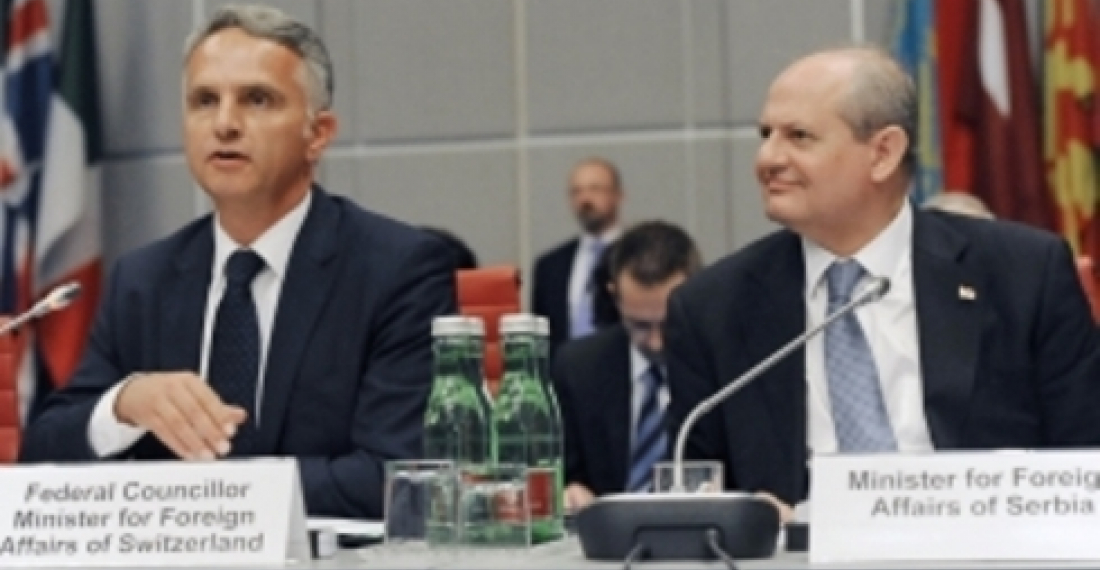Южный Кавказ будет одним из основных направлений работы во время швейцарского председательства в ОБСЕ в 2014 году. Программные приоритеты также разделяет и Сербия, которая возьмет на себя председательство в 2015 году. В заявлении, опубликованном сегодня в ОБСЕ в Вене говорится, что министры иностранных дел Швейцарии и Сербии, Дидье Буркхальтер и Иван Мркич, сегодня утром изложили план совместной работы их последовательного председательства в ОБСЕ в 2014 и 2015 годах на специальном заседании Постоянного совета в Вене.
"Принимая руль в следующем году, мы хотим внести свой вклад в создание сообщества безопасности", сказал Буркхальтер. Он подчеркнул, что диалог на Южном Кавказе, модернизация договоров механизмов военной прозрачности, обмена информацией о будущем контроля над обычными вооружениями и совершенствование управления в секторе безопасности стоят среди приоритетов Швейцарии в военно-политическом направлении деятельности ОБСЕ.
Улучшение условии жизни людей путем "борьбы с пытками, уважения прав человека в борьбе с терроризмом, защиты борющихся за права человека, и уважение прав лиц, принадлежащих к национальным меньшинствам," также будет одним из направлений, заявил Буркхальтер. Учитывая тесное сотрудничество между двумя председателями, взаимодействие по Западным Балканам также является приоритетом для Швейцарии.
Говоря о процессе укрепления эффективности ОБСЕ "Хельсинки +40" в преддверии 40-летия Хельсинкского заключительного акта в 2015 году, Мркич сказал: "Мы ожидаем долгие и, скорее всего, трудные дискуссии по многим вопросам, таким как разрешение затяжных конфликтов, новые транснациональные угрозы и вызовы, диалог по контролю над вооружениями, кибер-безопасность, вопросы связанные с правами человека, и это только некоторые из них."
Согласно заявлению ОБСЕ, Швейцария и Сербия будут тесно координировать между собой в течение двух последовательных председательств. В то время как каждая страна будет нести ответственность в течение одного года в качестве председателя в одиночку, они хотят максимизировать координацию, с тем чтобы обеспечить непрерывость и определенность в планировании ОБСЕ и ее государств-участников.
Политический редактор Commonspace.eu сообщает:
"В международном сообществе существует надежда, что председательство Швейцарии в следующем году обеспечит ОБСЕ сильным политическим руководством в период, когда организация воспринимается как дрейфующая. Организации до сих пор не оправились от бездействия в период грузино-российского военного конфликта в 2008 году, учитывая ее роль в качестве ведущего международного посредника в конфликте в Южной Осетии. Она также сталкнулась с рядом политических и организационных проблем. Исторический нейтралитет Швейцарии поможет ей сориентироваться между Востоком и Западом, трещина между которыми в рамках ОБСЕ пролегает более чем два десятилетия после окончания холодной войны. Решение сделать Южный Кавказ одним из приоритетных направлений швейцарского председательства похвально, хотя это повышает ожидания, которые не обязательно могут быть выполнены. Швейцария воспринимается в качестве честного посредника в регионе, и может быть в состоянии достичь большего, чем другие, но для достижения результатов швейцарий нужны будут рычаги поддержки остальной части международного сообщества. Мощный ЕС-швейцарский диалог на Южном Кавказе в период до конца года может быть очень полезным".
Источник: Commonspace.eu по материалам пресс-службы ОБСЕ.
Фото: Министры иностранных дел Швейцарии и Сербии на Постоянном совете ОБСЕ в Вене, 2 июля 2013 года. (фото любезно предоставлено ОБСЕ).







